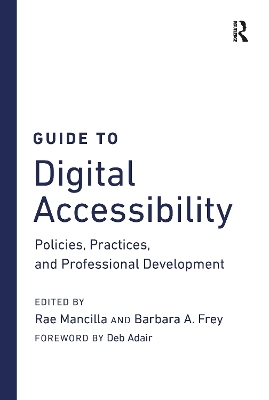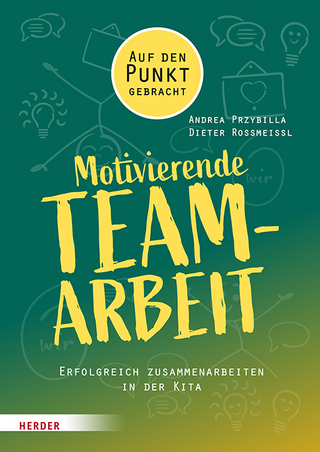
Guide to Digital Accessibility
Stylus Publishing (Verlag)
978-1-64267-452-1 (ISBN)
Approximately 8.5% of the general population of the United States has a disability affecting their computer and Internet use, which translates to over 28 million people in the U.S. alone whose disability impacts their access to digital content. Recent data indicates that around 19% of undergraduate students have a disability, yielding consequential implications for institutions of higher education. Regardless of disabilities or environmental constraints, educators have a legal and ethical responsibility to create online learning experiences that are accessible and usable by all learners.
Addressed to higher education administrators, instructional designers, faculty developers, and faculty, this edited volume showcases the experiences and practices of Quality Matters institutions around the core tenets of digital accessibility, offering examples of policy, processes, practices, tools, and professional development. The contributors represent a carefully curated body of institution types and classifications to ensure that all readers can transfer concepts into the contexts of their respective institutions.
The book situates the digital accessibility movement within the context of major federal legislation, such as the Americans with Disabilties Act of 1990. It traces the evolution of Web Content Accessibility Guidelines for online course design and professional development based on the Quality Matters framework.
Subsequent chapters describe the evolution of accessibility policy development as a driver of organizational culture, as well as a continuum of course design practices that can be implemented to proactively develop inclusive instructional materials.
The Guide concludes by identifying a myriad of professional development formats for fostering accessibility knowledge and skill acquisition, including asynchronous workshops, micro credentials, and train-the-trainer models, sharing evaluation protocols that foster continuous improvement.
Written for practitioners by practitioners, this book addresses vital compliance issues and maps a range of proven practices that will enrich the learning experience of all learners in digital environments.
Rae Mancilla, Ed.D., (she/her) is the Assistant Director of Online Learning for the School of Health and Rehabilitation Sciences at the University of Pittsburgh, Pennsylvania, where she leverages over a decade of curriculum development, instructional design, teaching, assessment, and project management expertise. She is also an active educator and researcher, instructing courses at the graduate and undergraduate levels. In addition, Rae serves as a Peer Reviewer and Research Colleague for Quality Matters and a bilingual Peer Evaluator for the Middle States Commission for Higher Education. Her research interests include the professional development of instructional designers, language learning and technology, digital accessibility, and program evaluation. Her scholarship has been published in peer-reviewed journals, including the Journal for Applied Instructional Design, Applied Linguistics, the American Journal of Distance Education, and Language, Learning, and Technology. Recent publications include the QM Digital Accessibility White Paper Series. Rae also reviews manuscripts for journals, including the American Journal of Distance Education, Applied Linguistics, and the International Journal of Applied Linguistics. Barbara A. Frey, D.Ed., (she/her) is an Assistant Professor with the School of Education at Point Park University in Pittsburgh, Pennsylvania, and an Instructional Design Consultant with the University of Pittsburgh. She is also an active Quality Matters Facilitator, Master Reviewer, and Research Colleague. Throughout her career, Barbara has collaborated with hundreds of faculty on the design and development of traditional, online, hybrid, and massive open online courses (MOOCs). Her work has resulted in award-winning programs including several Blackboard Catalyst Awards. She has served as a Peer Evaluator for the Middle States Commission for Higher Education. Barbara is co-author of the book Distinctive Distance Education Design: Models for Differentiated Instruction. In addition, she has published numerous book chapters and scholarly articles in the Journal of Applied Instructional Design, Journal of Asynchronous Learning Networks, Journal on Excellence in College Teaching, TechTrends, and the International Journal of Information and Communication Technology Education. Most recently, she co-authored the QM Digital Accessibility White Paper Series.
Foreword Preface Acknowledgments Part 1. Digital Accessibility Background and Historical Perspectives 1. History of the Known. Digital Accessibility as an Issue of Social Justice in U.S. Education 2. Evolution of Quality Matters General Standard 8. Accessibility and Usability 3. Quality Matters Professional Development for Addressing Accessibility and Usability Part 2. Digital Accessibility Policy 4. A Systems Approach to Change. Putting Inclusion and Accessibility into Practice 5. Mixed-Methods Research to Support Development of a Campus-Wide Digital Accessibility Policy 6. Development and Implementation of an Electronic and Information Technology Accessibility Policy 7. A Case in Strategic Institutional Accessibility 8. Promoting Accessibility through the Revision of a Distance Education Policy Part 3. Digital Accessibility Course Development Practices and Tools 9. Designing Inclusive Formal and Informal Online Learning. What Do Instructors Need to Know? 10. Using a Pilot Study to Pivot Toward Digital Accessibility Practices 11. Six Keys for Accessible Online Course Development 12. Scenarios and Solutions. An Instructional Designer’s Perspective on Creating Accessible Courses 13. Digital Accessibility in Higher Education. Moving Practices from Ad Hoc to Intentional 14. Maintaining the Momentum. Developing Accessibility Awareness 15. Technology Tools to Promote Digital Accessibility Part 4. Digital Accessibility Professional Development 16. One Size Does Not Fit All. Faculty Development for Digital Accessibility 17. Professional Development Strategies for Digital Accessibility Awareness 18. Three Approaches to Teaching Accessibility and Universal Design 19. Using a Constructivist Approach to Bridge Digital Accessibility from Theory to Practice Across a University System 20. Accessibility as Conventional Practice. An Accessibility and Inclusive Design Professional Development Strategy 21. Designing Professional Development Courses for Digital Accessibility in Higher Education 22. Adapting Professional Development to Improve Accessibility in the Online Environment 23. The Case for Continuous Professional Development in Accessible Course Design List of Common Abbreviations Editors and Contributors Index
| Erscheinungsdatum | 28.09.2023 |
|---|---|
| Sprache | englisch |
| Maße | 152 x 229 mm |
| Gewicht | 526 g |
| Themenwelt | Sozialwissenschaften ► Pädagogik ► Erwachsenenbildung |
| ISBN-10 | 1-64267-452-4 / 1642674524 |
| ISBN-13 | 978-1-64267-452-1 / 9781642674521 |
| Zustand | Neuware |
| Informationen gemäß Produktsicherheitsverordnung (GPSR) | |
| Haben Sie eine Frage zum Produkt? |
aus dem Bereich


